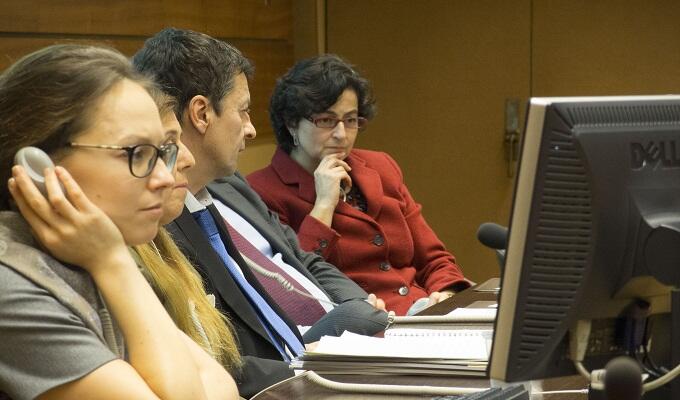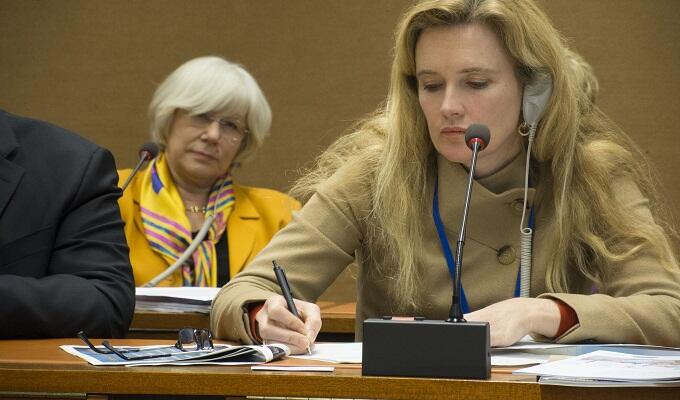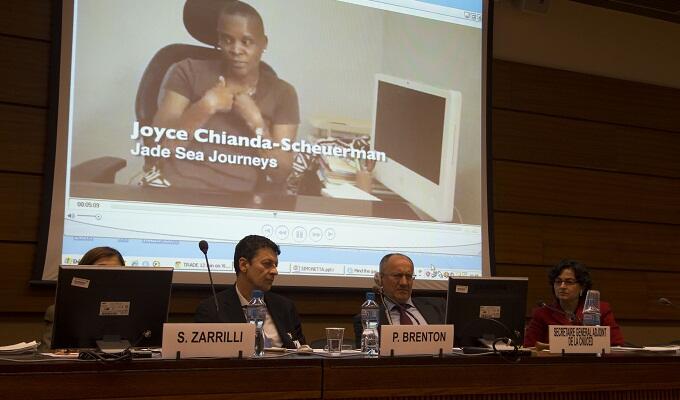



Addressing women-specific trade constraints to unlock economic benefits in Africa (en)
Increased participation of women in trade in Africa leads to economic diversification, increased regional trade and, ultimately, poverty reduction.
However, women’s economic potential is held back by specific constraints, such as lack of access to information, difficulties in obtaining required documents and poor conditions when crossing borders, agreed panellists at the session on ‘Women and Trade in Africa: Realizing the Potential’ on 20 January at the United Nations Conference on Trade and Development (UNCTAD).
The event was jointly organized by the World Bank, UNCTAD and the International Trade Centre (ITC), and it was moderated by ITC Executive Director Arancha González.
‘The gender dimension should be properly incorporated in trade policy, including in areas that hold great promise, such as trade in services,’ Ms. González said, naming a sector that increasingly involves more women, in countries such as The Gambia, Rwanda and Cape Verde. ‘But not only in trade policy, but in macroeconomic policies.’
‘We are talking about leveling the playing field in participating in trade – competition at all levels of the [value] chain,’ said Paul Brenton, Lead Economist and Trade Practice Leader, at the World Bank’s Poverty Reduction and Economic Management Department.
Women are heavily involved in trade, mostly through informal cross-border trade, which accounts for about US$ 20 billion a year, Mr. Brenton said. Between 70% and 80% of informal trade is done by women. Women are also producers of goods and services, especially in the agriculture sector, and they are entrepreneurs who own exporting companies.
However, women’s contribution to trade is often overlooked by policymakers because of a lack of data and awareness, a lack of analysis and a lack of representation in trade-policy discussions.
‘Trade doesn’t automatically reduce gender disparity,’ said UNCTAD Deputy Secretary-General Petko Draganov. ‘There is a need to dynamize sectors where women operate and create opportunities for women. Proactive measures are needed in these sectors, and these measures should acknowledge gender disparity.’
To do this, the panellists agreed, women-specific trade barriers need to be addressed: a lack of transparency and awareness of trade rules; difficulties in obtaining required documents, which are often available only in capital cities; access to trade information and trader networks; and poor conditions and harassment when crossing borders, such as bribes, confiscation of goods and violence.
Trade policy needs to be ‘more gender aware’, said Simonetta Zarrilli, Chief of UNCTAD’s Trade, Gender and Development Section. Ms. Zarrilli also recommended gender-sensitive models of supply chains that link small-scale, women producers with big buyers, as well as product-differentiation strategies and exploration of niche markets as ways for women to become more involved in trade.
Women in Africa need better access to resources, such as credit, land, technology, infrastructure and information, to take full advantage of trade, and to go beyond the informal sector to becoming producers and business owners, the panelists agreed. Women will also need to have more opportunities to upgrade their skills through education and job training.
‘If you start with fewer opportunities, the results you can achieve are not comparable,’ Ms. Zarrilli said.
One of the major remaining challenges, according to Mr. Brenton, is monitoring results of interventions that aim to address these issues.
‘How do we monitor the changes, so that the changes we are anticipating are actually realized?’ Mr. Brenton said. ‘Most of the indicators we have are about compliance, not about how the agreements are having an impact on the ground.
We’re trying to change that using ICT,’ he added, referring to information and communications technologies. One example is the use of mobile phones to record incidences of harassment, and to track the number of incidences over time.
‘It’s important to make sure we choose the right set of indicators so that we can do proper monitoring so that the results will give us a true picture of whether the situation is improving, and how much it is improving, and for whom,’ Ms. González said.
‘We have to make sure entrepreneurship is featured in the post-2015 development agenda,’ Ms. González said, in closing the discussion. ‘We know that small and medium-sized enterprises are the largest employers of women.’



